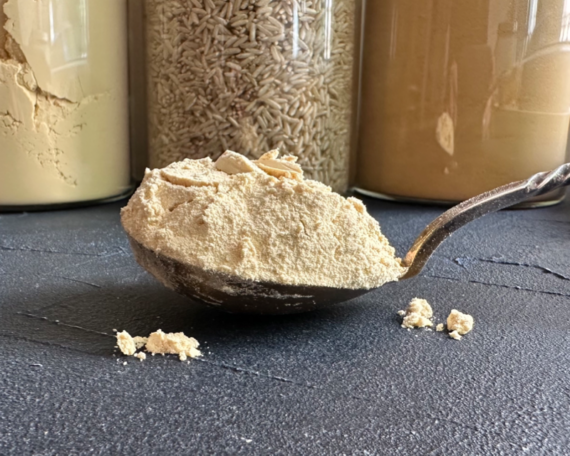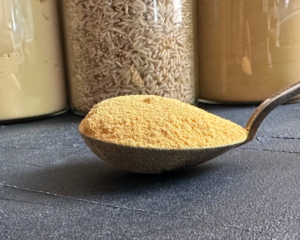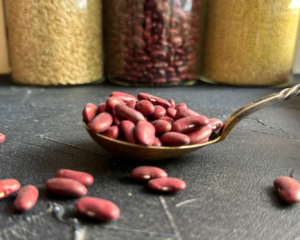Organic pea protein powder (isolate, 80% protein)
From 2.05€
Organic pea protein powder (isolate, 80% protein)
Pea Protein Powder Isolate is made from broken yellow peas (Pisum sativum), a legume known for its exceptional protein content. The process involves separating the proteins from the peas, leaving the carbohydrates and fibre behind, resulting in a highly concentrated protein powder. The isolation process typically involves steps such as cleaning, drying and milling of the peas, followed by removal of starch and fibre to produce a pure protein isolate. This careful production ensures that pea protein powder isolate is a clean, harmless and nutrient-rich source of plant protein, making it the preferred choice for a wide range of dietary needs and culinary applications.
Consumers looking for organic products can trust that Organic Pea Protein Powder Isolate is produced according to organic principles, with an emphasis on sustainability, environmental responsibility and the absence of synthetic chemicals. This process produces a high quality organic product.
Benefits of Pea Protein Powder Isolate
– Protein Source. Pea protein powder isolate often has a protein content of over 90% by weight. This makes it an excellent choice for those who want to increase their protein intake, especially vegans, vegetarians and athletes.
– Amino acids. While most plant protein sources lack certain essential amino acids, pea protein is unique in that it contains a balanced amino acid profile, including branched chain amino acids (BCAAs), leucine, isoleucine and valine. They are essential for muscle repair and growth.
– Digestion. Pea protein is generally easy to digest and less likely to cause gastrointestinal discomfort than some other plant-based protein sources such as soya or beans.
– Weight management. A high protein intake can help you feel full and possibly reduce your overall calorie intake.
– Heart health. Pea protein has been associated with potential cardiovascular benefits, including the ability to lower blood pressure and cholesterol.
Attention
In some people, pea protein may cause temporary gas and bloating. Gradually increasing intake can reduce these side effects.
Although rare, some people may be allergic to peas and may experience allergic reactions when consuming pea protein. Be careful.
If you experience digestive discomfort, reduce your intake or try another protein source.
Use of Pea Protein Powder Isolate
– Glotnučiai. Mix pea protein powder into your smoothie and you’ll get protein fast.
– Baked goods. Replace some of the flour in recipes for baked goods such as pancakes, muffins and biscuits with pea protein powder isolate to increase the protein content.
– Cooking. Add to soups, stews or sauces to increase the protein content of dishes.
– Energy bars. Make your own homemade protein bars using pea protein powder isolate, nuts and dried fruit.
– Salad dressings. Make salad dressings with pea protein powder isolate for a creamy texture and added protein.
Sources:
https://www.researchgate.net
https://www.healthline.com
NOTE.
The information contained herein is not to be construed as a recommendation for treatment or other health issues.
We encourage you to make personal health decisions based on your own personal experience and consideration of a variety of sources of information.
Organic yellow/white peas 100%
Energy 1687 Kj / 403 Kcal
Fat - 7,5 g
- Of which saturated - 2,3 g
Carbohydrates - 2.2 g
- Of which <0,1 g sugar
Fiber - 2,6 g
Protein - 83 g
Salt - 2,5 g
Store in a cool, dry place away from direct sunlight.



